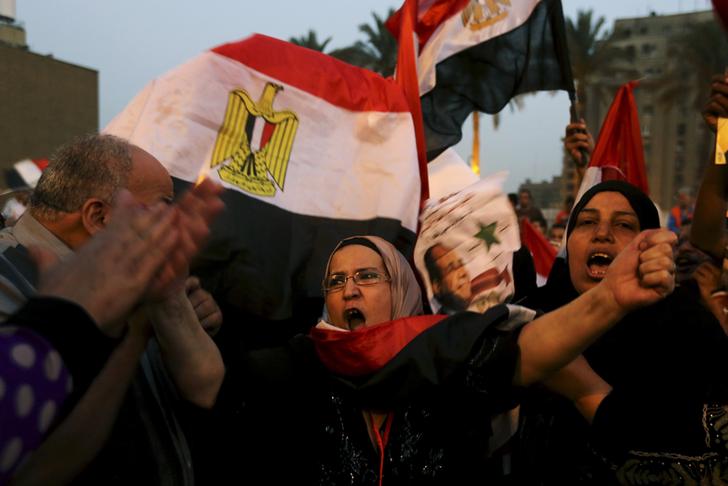Latest NEWS
- Aswat Masriya, the last word
- Roundup of Egypt's press headlines on March 15, 2017
- Roundup of Egypt's press headlines on March 14, 2017
- Former Egyptian President Hosni Mubarak to be released: lawyer
- Roundup of Egypt's press headlines on March 13, 2017
- Egypt's capital set to grow by half a million in 2017
- Egypt's wheat reserves to double with start of harvest -supply min
- Roundup of Egypt's press headlines on March 12, 2017
Sisi won 96.91 percent in Egypt's presidential election - commission

Supporters of Egyptian former army chief Abdel Fattah al-Sisi cheer as they gather in Tahrir square in Cairo May 27, 2014. REUTERS/Mohamed Abd El Ghany
By Yasmine Saleh
CAIRO, June 3 (Reuters) - Former Egyptian army chief Abdel Fattah al-Sisi won 96.91 percent in a presidential vote last week, the election commission said on Tuesday, confirming interim results that had given him a landslide victory.
But turnout was only about 47 percent of Egypt's 54 million voters, the commission said - less than the 40 million votes, or 80 percent of the electorate, that Sisi had called for.
Sisi gained wide support from Egyptians after toppling President Mohamed Mursi of the Muslim Brotherhood last year, prompted by mass protests against his rule.
He now faces staggering challenges in a country where street demonstrations have helped to topple two leaders in three years.
The lower-than-expected turnout raises questions about Sisi's ability to maintain popularity while attempting to fix a battered economy, ease poverty and prevent further political crises from paralysing Egypt.
For now, Sisi's supporters seemed content to celebrate the moment, gathering by the thousands in Cairo's Tahrir Square, the symbolic heart of the uprising that ousted autocrat Hosni Mubarak in 2011, and elsewhere.
Fireworks could be heard downtown and in other parts of the capital, which has witnessed frequent street violence since security forces began a relentless crackdown against the Brotherhood after Mursi's fall.
Hundreds of Mursi supporters have been killed and thousands arrested. The movement's top leader has been sentenced to death and other prominent figures could face a similar fate.
Although Egyptians had high hopes of democracy when Mubarak was toppled after 30 years in power, what they seem to crave now more than anything is calm.
"For now, I think it is OK to compromise on freedoms for the sake of stability and security. What good will freedom without security bring us?" said shopkeeper Refat Ahmed, 30.
Critics view Sisi as another strongman who will protect the interests of the military and crush dissent.
Human rights groups say abuses have spread since Mursi's downfall, with opponents of the government that Sisi installed thrown in jail and tortured. Authorities deny that abuses occur.
Sisi's first priority will most likely be the economy, ravaged by the deterrent effect on tourists and investors alike of more than three years of upheaval in one of the Arab world's main powers.
A widening budget deficit is burdened by fuel subsidies that could cost nearly $19 billion in the next fiscal year, and high unemployment and rampant corruption are also on the agenda.
Shortly after the election result was announced, Saudi Arabia's King Abdullah announced a donor conference for a country that the world's top oil exporter sees as a frontline ally in its region-wide struggle against both Iran and the Islamist Muslim Brotherhood.
Saudi has been a main supporter of Sisi and the military government since the army overthrew Mursi. He said any country that did not contribute to Egypt's future despite having the ability to do so would "have no future place among us".
Sisi's handling of energy subsidies could be the first clue as to whether he is prepared to enact economic reforms. Investors want Sisi to end energy subsidies, impose a clear tax regime and give guidance on the direction of the exchange rate.
But raising energy prices could trigger protests. (Writing by Michael Georgy; Editing by Kevin Liffey)










